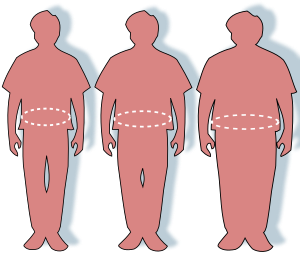Morbidly obese
| Obesity | |
|---|---|
 |
|
| Silhouettes and waist circumferences representing optimal, overweight, and obese | |
| Specialty | Endocrinology |
| Symptoms | increased fat |
| Causes | excessive food, lack of exercise, genetics |
| Diagnostic method | BMI > 30 kg/m2 |
| Treatment | diet, exercise, medications, surgery |
| Frequency | 642 million (13%) |
| Classification | |
|---|---|
| External resources |
Obesity is a medical condition in which excess body fat has accumulated to the extent that it may have a negative effect on health. People are generally considered obese when their body mass index (BMI), a measurement obtained by dividing a person's weight by the square of the person's height, is over 30 kg/m2, with the range 25–30 kg/m2 defined as overweight. Some East Asian countries use lower values. Obesity increases the likelihood of various diseases, particularly heart disease, type 2 diabetes, obstructive sleep apnea, certain types of cancer, and osteoarthritis.
Obesity is most commonly caused by a combination of excessive food intake, lack of physical activity, and genetic susceptibility. A few cases are caused primarily by genes, endocrine disorders, medications, or mental illness. The view that obese people eat little yet gain weight due to a slow metabolism is not generally supported. On average, obese people have a greater energy expenditure than their thin counterparts due to the energy required to maintain an increased body mass.
...
Wikipedia
